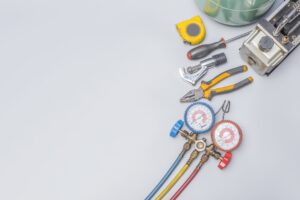
The term “refrigerant leak” is probably one you never want to hear when you’re the owner of an air conditioning system owner. It’s a toss-up on whether this will spell an expensive disaster for your home comfort and your system, or if it’s just going to be a quick patch and recharge. Only a professional can tell the difference, and you will need to call for one no matter what.
However, just because you’re weary of encountering a refrigerant leak doesn’t mean that you can’t be more informed about it! Refrigerant leaks are pretty common problems, and while they can be caused by any number of different things, they’re usually detectable through a few signs. And, to make things a bit easier, refrigerant leaks always need to be fixed with air conditioning repair in Marrero, LA if you care about your home comfort or your energy efficiency. They can only really get worse over time.
How can I quickly tell if my AC has a refrigerant leak?
Common signs of a refrigerant leak include weak or warm airflow, hissing or bubbling noises, ice buildup on the coils, and a noticeable drop in cooling performance. These symptoms usually indicate your AC needs professional repair to restore proper function.
Top Signs of a Refrigerant Leak in Your AC
- Your air conditioner struggles to reach or maintain the set temperature—it never cools enough.
- Your energy bills climb noticeably, because the system works harder to cool the home.
- Ice builds up on the evaporator coil or refrigerant lines, often causing water when it melts.
- You hear hissing or bubbling noises signaling escaping refrigerant
- You may spot oily residue around AC lines or components
- Warm air comes from the vents even when the system is running
What Causes AC Refrigerant Leaks?
Refrigerant leaks can be caused by a number of different things. Sometimes it’s foul weather like a storm. Other times a pest can chew on your air conditioner’s refrigerant line and cause it to rupture. The cause of the problem isn’t really the important part, since once you’ve already detected a refrigerant leak, you need to start investing in ways to stop it. In some cases, external damage can also result in visible dripping or water pooling near the unit.
How to Detect a Refrigerant Leak
Here are three simple ways to detect a refrigerant leak:
- Bubbling and hissing noises. A bubbling or hissing noise can often be made from an air conditioner that’s leaking refrigerant. The bubbling is air bubbles forming inside of the system and the hissing is the sound of gaseous refrigerant escaping! If this is paired with other symptoms, it could indicate major system issues on the horizon.
- A spiking energy bill. With less refrigerant in the system, your air conditioner will have to work harder in order to provide the same level of cooling. This will consume more energy and cause a spike in your electricity bill.
- Lukewarm air coming from the vents. Even if your AC can’t cool the air because it’s low on refrigerant, it will still blow lukewarm air into the rooms of your home. This can be a sign of an impending problem.
Is Refrigerant Dangerous? Myths vs. Facts
We want to clear something up today. Refrigerant isn’t dangerous to breathe in, nor is it going to cause any immediate side effects when you’re around it. That being said, if refrigerant is leaking into the rooms of your home. This can be a sign of an impending problem like short cycling or compressor strain. Then we still recommend you call for immediate help and evacuate the premises.
Refrigerant is denser than air, which means it fights against oxygen inside of your home when there’s only a limited amount of space. That refrigerant can push out the oxygen inside of your home and cause suffocation in certain situations. So, while refrigerant itself isn’t toxic, it can be a dangerous for your family if it’s leaking inside of your home.
You’ll be able to notice it’s there by a sweet, chloroform-like scent that wafts through the air. If you detect this, it’s time to get out! For your long-term comfort and safety, it’s worth asking whether your aging AC might be ready for retirement.
Frequently Asked Questions
Question: What typically causes a refrigerant leak in an AC system?
Answer: Refrigerant leaks can arise from common issues like storm damage or pests chewing through lines. These leaks can cause visible drips or pooled water near your unit, signaling that you should take action.
Question: What are the warning signs of a refrigerant leak?
Answer: Listen for bubbling or hissing sounds in the system. You might also notice a spike in your energy bill or lukewarm air from the vents—these often indicate a leak.
Question: Is refrigerant toxic to breathe in?
Answer: Refrigerant itself isn’t directly toxic. However, because it’s denser than air, leaks indoors can displace oxygen and pose suffocation risks. If you suspect an indoor leak, seek professional help immediately.
Question: Should I attempt to fix a refrigerant leak myself?
Answer: No—detecting a leak is one thing, but repairs must be handled by a professional. Only certified technicians can safely repair the system and recharge refrigerants properly.
We Value Service Honoring the Golden Rule. Contact Natal’s HVAC, Plumbing & Electrical to have your refrigerant leak fixed.
